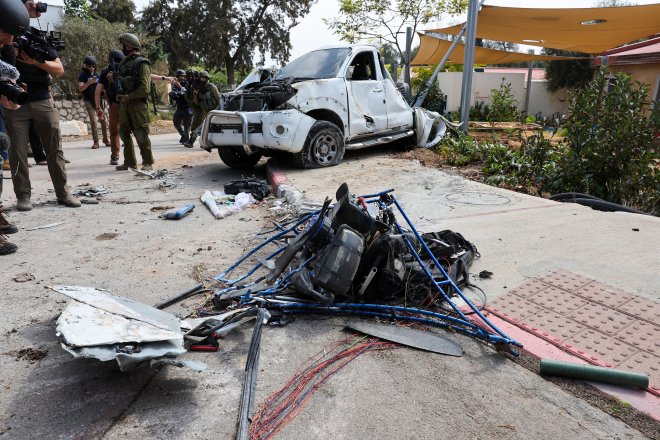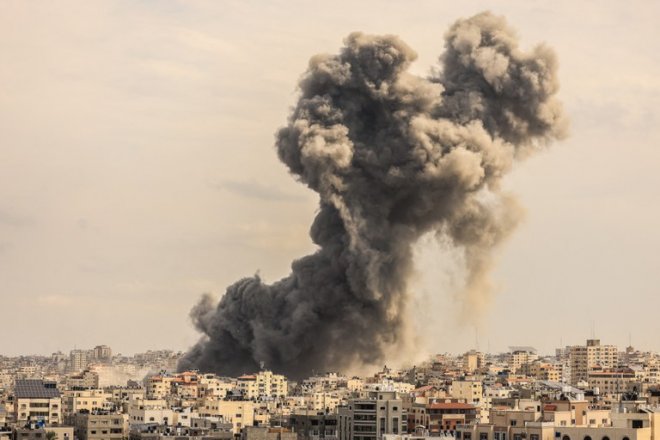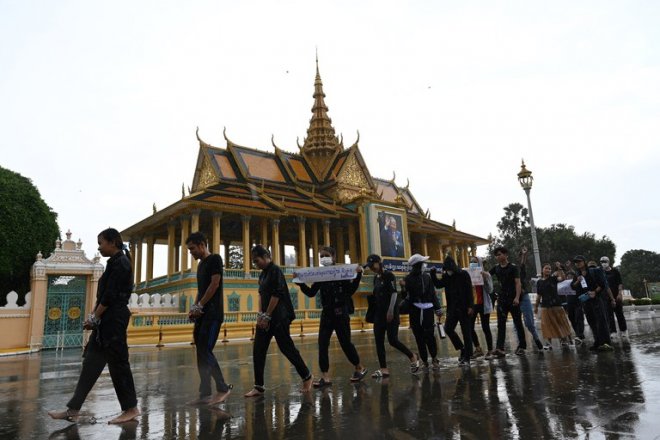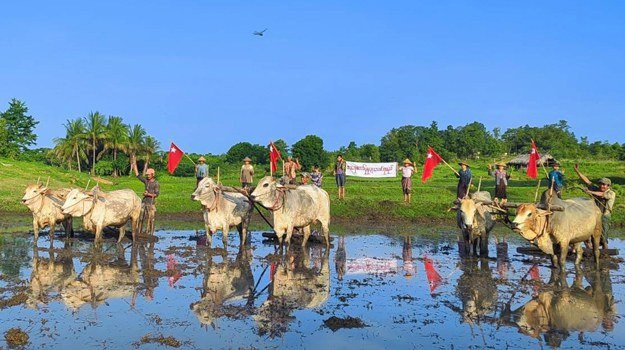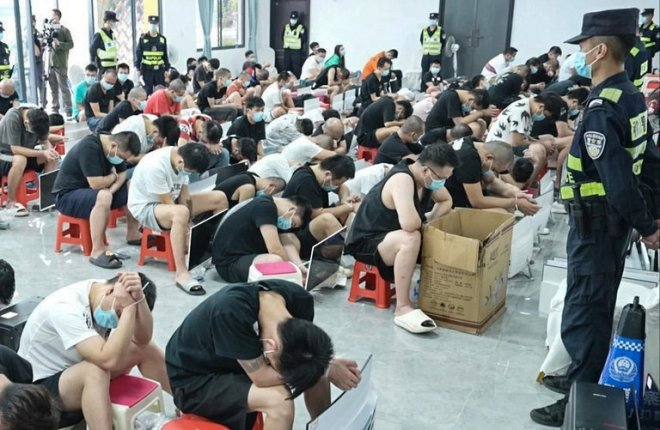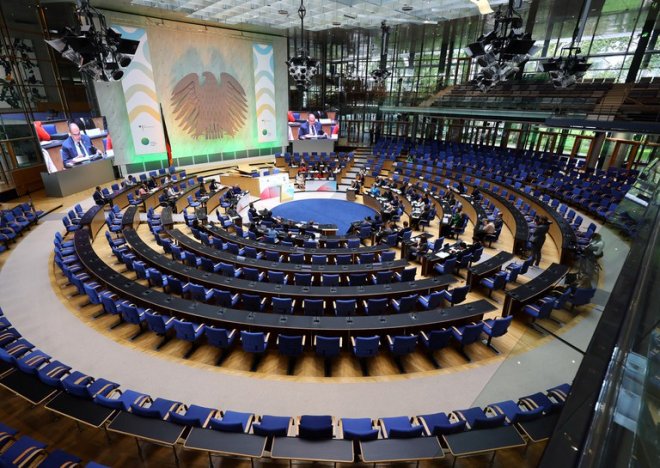China, Myanmar criticized for attacks on religious freedom in annual U.S. report
China came under harsh criticism for new restrictions on religious freedom in the U.S. State Department’s annual global report on religious freedom, released Monday.
Myanmar’s junta was also faulted for its troop’s attacks on religious sites amid the civil war there.
The 2022 International Religious Freedom Report, which provides an overview of the state of religious freedom in nearly 200 countries and territories around the world, highlighted how China is trying to “Sinicize” all religious practices in line with Communist Party doctrine.
That includes requiring clergy members of all faiths to attend political indoctrination sessions and suggesting content for sermons that emphasize loyalty to the party and the state, the report said.
It cited an Oct. 16 speech to the 20th Party Congress in which President Xi Jinping stated that the party would “remain committed to the principle that religions in China must be Chinese in orientation and provide active guidance to religions so that they can adapt to socialist society.”
The report highlighted Chinese repression of the predominantly Muslim Uyghurs and Tibetan Buddhists, living in the far western part of the country, as well as Chinese Christians.
“The People’s Republic of China seized, imprisoned, and banished predominantly Muslim Uyghurs to re-education camps,” said U.S. Secretary of State Antony Blinken in an address on Monday. “They continue the repression of Tibetan Buddhists, Chinese Christians and Falun Gong practitioners.”
![]() The Chinese national flag is raised during a ceremony marking the 96th anniversary of the founding of the Communist Party of China at Potala Palace in Lhasa, July 1, 2017. Members of the armed forces are required to be atheists and are forbidden to engage in religious practices. Credit: He Penglei/CNS via Reuters
The Chinese national flag is raised during a ceremony marking the 96th anniversary of the founding of the Communist Party of China at Potala Palace in Lhasa, July 1, 2017. Members of the armed forces are required to be atheists and are forbidden to engage in religious practices. Credit: He Penglei/CNS via Reuters
Rushan Abbas, executive director of Campaign for Uyghurs, a Uyghur advocacy group based in Washington, said the report serves as a “powerful testament to the pressing need to address the Uyghur genocide” and hold the Communist Party accountable.
“We commend the efforts behind this report and remain hopeful that its findings will lead to international solidarity in addressing the plight of the Uyghur people and other persecuted communities,” she told Radio Free Asia.
New law
The report cited a new law in China that went into effect in March 2022, the Measures for the Administration of Internet Religious Information Services, which bans unauthorized domestic online religious content and prohibits foreign organizations and individuals from spreading online religious content in China.
The Chinese government has blocked religious websites and censored religious content from the WeChat messaging platform, the report said. Authorities have also censored posts referencing Jesus or the Bible, removed articles published by Christian platforms and removed accounts whose names contained the words “gospel” or “Christ.”
Chinese authorities also continue to restrict the printing and distribution of Bibles, Qurans and other religious literature.
Though China’s constitution states that citizens “enjoy freedom of religious belief,” it limits protections for religious practice to “normal religious activities,” without defining “normal,” the report said.
![]() A dismantled minaret of Xinqu Mosque lies by a Chinese national flag near the house of worship in Changji outside Urumqi, Xinjiang, May 6, 2021. Credit: Thomas Peter/Reuters
A dismantled minaret of Xinqu Mosque lies by a Chinese national flag near the house of worship in Changji outside Urumqi, Xinjiang, May 6, 2021. Credit: Thomas Peter/Reuters
The government officially recognizes only Buddhism, Taoism, Islam, Protestantism and Catholicism, and bans spiritual groups it deems to be cults or to promote unorthodox teachings. The regulations require clergy members to pledge allegiance to the Chinese Communist Party and socialism and to resist illegal religious activities and infiltration by foreign forces using religion, the report said.
Authorities arrested and detained leaders and worshipers not registered with the state-sanctioned religious associations. Communist Party members and members of the armed forces are officially atheist and are forbidden to engage in religious practices.
Myanmar
Among countries in Southeast Asia, Myanmar stood out in the report because of the military junta’s attacks on religious sites amid a widespread assault on civilians in areas where ethnic armed groups and local forces oppose the regime and clash with soldiers.
“Amidst the Burma military regime’s ongoing repression of religious minorities, thousands of teachers from Muslim, Buddhist, Christian, and other religious backgrounds continue to teach the importance of human rights, including religious freedom and respect between religions,” Blinken said.
The State Department’s report cited several instances of attacks by junta forces on places of worship, reported by Radio Free Asia.
Among them were a Sept. 16 airstrike in Sagaing region, that destroyed a school within a Catholic monastery compound, killing seven children and injuring another 17 and another airstrike the same day in Shan state, killing four individuals, including two children, seeking refuge in a Buddhist monastery
It cited the detaining or killing of Buddhist monks for alleged links to anti-junta People’s Defense Force groups, while holding dozens of other monks in various prisons throughout the country since the military seized power on Feb. 1, 2021.
The junta destroyed scores of religious buildings in Myanmar, including dozens of churches in Chin state, churches and a mosque in Kayah state, religious buildings in Sagaing region, and Buddhist monasteries and a church in Magway region.
The U.S. Department of State submits the reports in accordance with the International Religious Freedom Act of 1998.
RFA Uyghur contributed to this report. Edited by Malcolm Foster.
[圖擷取自網路,如有疑問請私訊]
Myanmar’s junta was also faulted for its troop’s attacks on religious sites amid the civil war there.
The 2022 International Religious Freedom Report, which provides an overview of the state of religious freedom in nearly 200 countries and territories around the world, highlighted how China is trying to “Sinicize” all religious practices in line with Communist Party doctrine.
That includes requiring clergy members of all faiths to attend political indoctrination sessions and suggesting content for sermons that emphasize loyalty to the party and the state, the report said.
It cited an Oct. 16 speech to the 20th Party Congress in which President Xi Jinping stated that the party would “remain committed to the principle that religions in China must be Chinese in orientation and provide active guidance to religions so that they can adapt to socialist society.”
The report highlighted Chinese repression of the predominantly Muslim Uyghurs and Tibetan Buddhists, living in the far western part of the country, as well as Chinese Christians.
“The People’s Republic of China seized, imprisoned, and banished predominantly Muslim Uyghurs to re-education camps,” said U.S. Secretary of State Antony Blinken in an address on Monday. “They continue the repression of Tibetan Buddhists, Chinese Christians and Falun Gong practitioners.”
 The Chinese national flag is raised during a ceremony marking the 96th anniversary of the founding of the Communist Party of China at Potala Palace in Lhasa, July 1, 2017. Members of the armed forces are required to be atheists and are forbidden to engage in religious practices. Credit: He Penglei/CNS via Reuters
The Chinese national flag is raised during a ceremony marking the 96th anniversary of the founding of the Communist Party of China at Potala Palace in Lhasa, July 1, 2017. Members of the armed forces are required to be atheists and are forbidden to engage in religious practices. Credit: He Penglei/CNS via ReutersRushan Abbas, executive director of Campaign for Uyghurs, a Uyghur advocacy group based in Washington, said the report serves as a “powerful testament to the pressing need to address the Uyghur genocide” and hold the Communist Party accountable.
“We commend the efforts behind this report and remain hopeful that its findings will lead to international solidarity in addressing the plight of the Uyghur people and other persecuted communities,” she told Radio Free Asia.
New law
The report cited a new law in China that went into effect in March 2022, the Measures for the Administration of Internet Religious Information Services, which bans unauthorized domestic online religious content and prohibits foreign organizations and individuals from spreading online religious content in China.
The Chinese government has blocked religious websites and censored religious content from the WeChat messaging platform, the report said. Authorities have also censored posts referencing Jesus or the Bible, removed articles published by Christian platforms and removed accounts whose names contained the words “gospel” or “Christ.”
Chinese authorities also continue to restrict the printing and distribution of Bibles, Qurans and other religious literature.
Though China’s constitution states that citizens “enjoy freedom of religious belief,” it limits protections for religious practice to “normal religious activities,” without defining “normal,” the report said.
 A dismantled minaret of Xinqu Mosque lies by a Chinese national flag near the house of worship in Changji outside Urumqi, Xinjiang, May 6, 2021. Credit: Thomas Peter/Reuters
A dismantled minaret of Xinqu Mosque lies by a Chinese national flag near the house of worship in Changji outside Urumqi, Xinjiang, May 6, 2021. Credit: Thomas Peter/ReutersThe government officially recognizes only Buddhism, Taoism, Islam, Protestantism and Catholicism, and bans spiritual groups it deems to be cults or to promote unorthodox teachings. The regulations require clergy members to pledge allegiance to the Chinese Communist Party and socialism and to resist illegal religious activities and infiltration by foreign forces using religion, the report said.
Authorities arrested and detained leaders and worshipers not registered with the state-sanctioned religious associations. Communist Party members and members of the armed forces are officially atheist and are forbidden to engage in religious practices.
Myanmar
Among countries in Southeast Asia, Myanmar stood out in the report because of the military junta’s attacks on religious sites amid a widespread assault on civilians in areas where ethnic armed groups and local forces oppose the regime and clash with soldiers.
“Amidst the Burma military regime’s ongoing repression of religious minorities, thousands of teachers from Muslim, Buddhist, Christian, and other religious backgrounds continue to teach the importance of human rights, including religious freedom and respect between religions,” Blinken said.
The State Department’s report cited several instances of attacks by junta forces on places of worship, reported by Radio Free Asia.
Among them were a Sept. 16 airstrike in Sagaing region, that destroyed a school within a Catholic monastery compound, killing seven children and injuring another 17 and another airstrike the same day in Shan state, killing four individuals, including two children, seeking refuge in a Buddhist monastery
It cited the detaining or killing of Buddhist monks for alleged links to anti-junta People’s Defense Force groups, while holding dozens of other monks in various prisons throughout the country since the military seized power on Feb. 1, 2021.
The junta destroyed scores of religious buildings in Myanmar, including dozens of churches in Chin state, churches and a mosque in Kayah state, religious buildings in Sagaing region, and Buddhist monasteries and a church in Magway region.
The U.S. Department of State submits the reports in accordance with the International Religious Freedom Act of 1998.
RFA Uyghur contributed to this report. Edited by Malcolm Foster.
[圖擷取自網路,如有疑問請私訊]
|
本篇 |
不想錯過? 請追蹤FB專頁! |
| 喜歡這篇嗎?快分享吧! |
相關文章
AsianNewsCast








